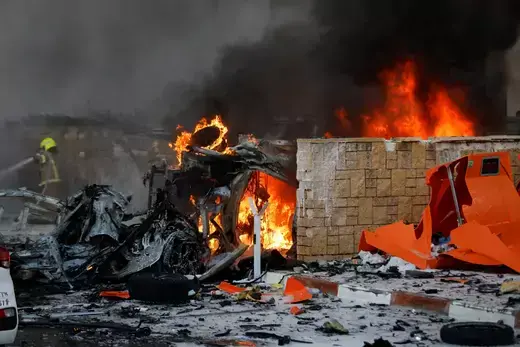How did the militant forces mount such an attack and how extensive was it?
Clearly Hamas has been planning this attack for some time. The group has previously tried to breach Israel’s borders, and in the process discovered weaknesses in Israeli defenses. The result was the Operation Al Aqsa Flood that has included incursions into Israel from land, sea, and air in the largest such assault on Israel in decades. Hamas has developed its own armory for producing rockets—it reportedly fired more than 2,000 of them at Israel on Saturday-- and other weapons. It receives help from Iran and over many years has smuggled material into Gaza from Egypt via underground tunnels, despite efforts to staunch the flow of materiel. From Hamas and its backers’ perspective, Israel seemed weak and divided given the months of popular demonstrations against the government over its effort to make critical changes to the judiciary.
Is there danger of this spreading into a region-wide conflict involving Iran?
Iran is, of course, a patron of Hezbollah [as well as Hamas and other Palestinian militant groups] and there is an ever-present danger of a two-front conflict, which would devastate parts of Israel and much of Lebanon, where Hezbollah is based. There is a risk of escalation. Israeli media reported that the Israeli Defense Forces [IDF] fired at a number of potential infiltrators along its border with Lebanon as the violence was unfolding in the southern part of the country.
More on:
Although much of the Western media did not notice, the leader of Iran’s Islamic Revolutionary Guard Corps’ Qods Force, General Esmail Qaani, had been meeting with Hamas, Hezbollah, and Islamic Jihad leaders in the region to coordinate and thus more effectively threaten and provoke Israel. Operation Al Aqsa Flood may be the result.
Given the possibility of an Iranian component to the attacks on Israel, it is possible that the ongoing shadow war between Jerusalem and Tehran will intensify.
What should we expect to happen in the Occupied Territories?
The Israelis are not going to replicate their previous operations in Gaza, which were typically of limited scope. Given the scale and success of Hamas’ attack, once the Israelis secure towns within their borders, they will undertake a significant operation in Gaza attacking targets from both the air and on the ground. So far the IDF has not issued a general call up, but significant numbers of units have been mobilized. The Israelis do not want to occupy the Gaza Strip, but the withdrawal from the area in 2005 can only now be regarded as a major mistake.
What should we look for in the U.S. response?
President Biden is a strong supporter of Israel. He is going to once again declare that Israel has a right to defend itself. The United States provides Israel with significant military assistance. In 2016, the two countries signed a Memorandum of Understanding that provides Israel with $38 billion in assistance through 2028. Given the scale of the Hamas attack and the damage it has done, the president will likely provide the Israeli government a lot of room to respond as it sees fit. Under these circumstances, no foreign government, including the United States, will have any leverage on Israel to respond with restraint.
More on:
